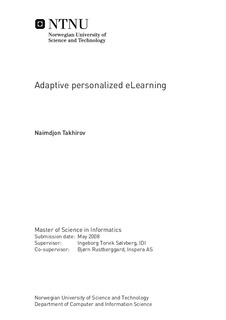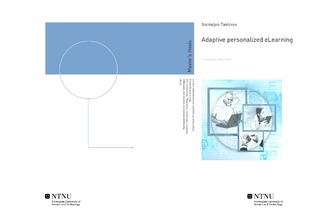| dc.contributor.advisor | Sølvberg, Ingeborg Torvik | nb_NO |
| dc.contributor.advisor | Rustberggard, Bjørn | nb_NO |
| dc.contributor.author | Takhirov, Naimdjon | nb_NO |
| dc.date.accessioned | 2014-12-19T13:32:07Z | |
| dc.date.available | 2014-12-19T13:32:07Z | |
| dc.date.created | 2010-09-03 | nb_NO |
| dc.date.issued | 2008 | nb_NO |
| dc.identifier | 347595 | nb_NO |
| dc.identifier | ntnudaim:3389 | nb_NO |
| dc.identifier.uri | http://hdl.handle.net/11250/250612 | |
| dc.description.abstract | This work has found that mapping prior knowledge and learning style is important for constructing personalized learning offerings for students with different levels of knowledge and learning styles. Prior knowledge assessment and a learning style questionnaire were used to assess the knowledge level and learning style. The proposed model for automatic construction of prior knowledge assessment aims to connect questions in the assessment to speci c course modules in order to identify levels on different modules, because a student may have varying levels of knowledge within different modules. We have also found that it is not easy to map students' prior knowledge with total accuracy. However, this is not required in order to achieve a tailored learning experience; an assessment of prior knowledge can still be used to decide what piece of content should be presented to a particular student. Learning style can be simply de ned as either the way people learn or an individual's preferred way of learning. The VAK learning style inventory has been found suitable to map the learning styles of students, and it is one of few learning style inventories appropriate for online learning assessment. A questionnaire consisting of 16 questions has been used to identify the learning style of students prior to commencement of the course. It is important to consider the number of questions, because the students may feel reluctant to spend too much time on the questionnaire. However, the user evaluation has shown that students willingly answer questions to allow the system to identify their learning styles. This work also presents a comprehensive overview of the state-of-the-art pertaining to learning, learning styles, Learning Management Systems, technologies related to web-based personalization and related standards and speci cations. A brief comparison is also made of various schools that have tried to address personalization of content for web-based learning. Finally, for evaluation purposes, a course on "Designing Relational Databases" was created, and a group of fourteen users evaluated the personalized course. | nb_NO |
| dc.language | eng | nb_NO |
| dc.publisher | Institutt for datateknikk og informasjonsvitenskap | nb_NO |
| dc.subject | ntnudaim | no_NO |
| dc.subject | MIT informatikk | no_NO |
| dc.subject | Informasjonsforvaltning | no_NO |
| dc.title | Adaptive personalized eLearning | nb_NO |
| dc.type | Master thesis | nb_NO |
| dc.source.pagenumber | 348 | nb_NO |
| dc.contributor.department | Norges teknisk-naturvitenskapelige universitet, Fakultet for informasjonsteknologi, matematikk og elektroteknikk, Institutt for datateknikk og informasjonsvitenskap | nb_NO |

